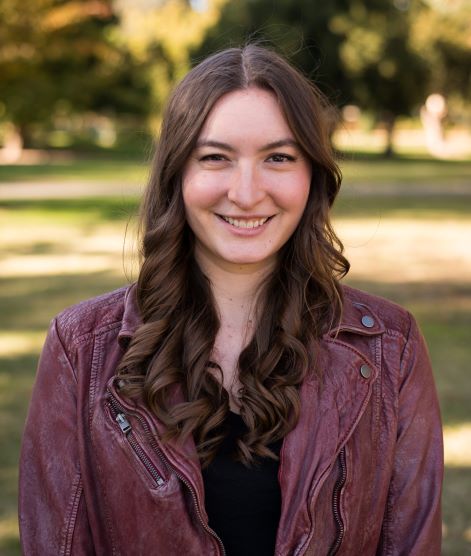Chloe Karaskiewicz
Department of Psychology
I am broadly interested in the relationship between physiological processes and social
relationships, particularly in the context of close social relationships like romantic partnerships
and parent/child dyads. As a graduate student, my work with coppery titi monkeys
(Plecturocebus cupreus) has explored how adult pair behavior changes in a variety of contexts:
pregnancy, infant rearing, contraceptive treatment, new pair formation, and social separation.
In addition to behavioral and endocrine methods (e.g., urinary hormone assays), I conduct
pioneering sleep research using species-novel methods in accelerometry to investigate the
relationship between sleep and the social environment within the context of close social
relationships in pair-bonded dyads. My work represents novel methods and investigation into
titi monkey reproduction and sleep, including the addition of novel methods and implications
for captive care and species management.
My interest in nonhuman primates and their sociality began during my undergraduate
education at the University of Wisconsin-Madison. As an undergraduate researcher under the
mentorship of Dr. Allyson Bennett, I worked with rhesus macaques (Macaca mulatta) to
examine age-related declines related to early life experience. For my senior honors thesis work,
I investigated the formation of early lateral biases in infant rhesus macaques. After graduating, I
received an Intramural Research Training Award (IRTA) from the National Institutes of Health
(NIH) to complete a 2-year postbaccalaureate fellowship in the Laboratory of Neuropsychology.
In my first year, I worked with Dr. Mortimer Mishkin and Dr. Janita Turchi on a project
investigating pharmacological manipulation of memory formation in rhesus macaques.
Following Dr. Mishkin’s retirement, I worked with Dr. Betsy Murray and Dr. Benjamin Basile on
projects investigating the role of the amygdala in memory, the role of the anterior cingulate
cortex in social decision-making, and methods for estimating the size and area of excitotoxic
lesions in the brain.
Outside of the lab, you can find me in the classroom teaching undergraduates about the
development of sex and gender, reproduction and fertility in PSC 159: Human Reproductive
Development in the Psychology Department at UC Davis or meeting with my undergraduate
researchers.
If you are curious about my research, teaching, or interested in our research opportunities, you
can contact me at clkaraskiewicz@ucdavis.edu.
Graduated in 2023
Publications
Karaskiewicz, C. L., Witczak, L. R., Lau, A. R., Dufek, M. E., Bales, K. L. (2021). Parenting costs
time: Changes in pair bond maintenance across pregnancy and infant rearing in a monogamous
primate (Plecturocebus cupreus). New Directions for Child and Adolescent Development.
Bales, K. L., Ardekani, C. S., Baxter, A., Karaskiewicz, C. L., Kuske, J. X., Lau, A. R., Savidge, L. E.,
Sayler, K. R., & Witczak, L. R. (2021). What is a pair bond? Hormones and Behavior, 136.
Basile, B. M., Joiner, J. A., Dal Monte, O., Fagan, N. A., Karaskiewicz, C. L., Lucas, D. R., Chang, S.
W. C., & Murray, E. A. (2021). Autonomic arousal tracks outcome salience not valence in
monkeys making social decisions. Behavioral Neuroscience, 135(3).
Basile, B. M., Schafroth, J. L., Karaskiewicz, C. L., Chang, S. W., & Murray, E. A. (2020). The
anterior cingulate cortex is necessary for forming prosocial preferences from vicarious
reinforcement in monkeys. Plos Biology, 18(6).
Basile, B. M., Karaskiewicz, C. L., Fiuzat, E. C., Malkova, L., & Murray, E. A. (2017). MRI
overestimates excitotoxic amygdala lesion damage in rhesus monkeys. Frontiers in Integrative
Neuroscience, 11, 12.
Recent Publications
Relationships between cortisol and urinary androgens in female titi monkeys (Plecturocebus cupreus). Gen Comp Endocrinol. 2021
Parenting costs time: Changes in pair bond maintenance across pregnancy and infant rearing in a monogamous primate (Plecturocebus cupreus). New Dir Child Adolesc Dev. 2021
What is a pair bond? Horm Behav. 2021
Compositional variation in early-life parenting structures alters oxytocin and vasopressin 1a receptor development in prairie voles (Microtus ochrogaster). J Neuroendocrinol. 2021
Biobehavioral organization shapes the immune epigenome in infant rhesus Macaques (Macaca mulatta). Brain Behav Immun. 2021
Cannabinoid receptor Type 1 densities reflect social organization in Microtus. J Comp Neurol. 2021
Pharmacological Prevention of Neonatal Opioid Withdrawal in a Pregnant Guinea Pig Model. Front Pharmacol. 2021

 University of California, Davis (UCD)
University of California, Davis (UCD)